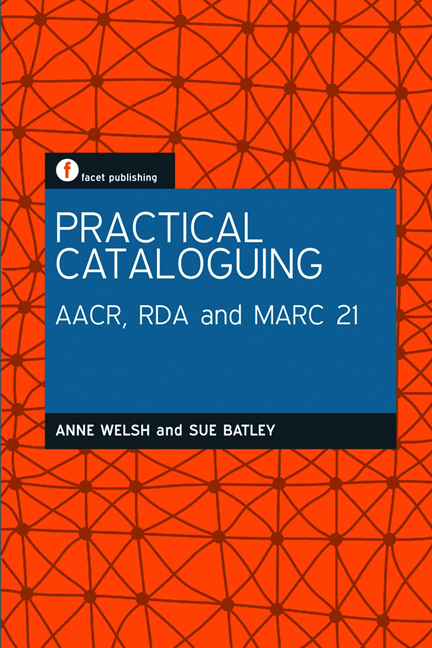Book contents
- Frontmatter
- Dedication
- Contents
- Acknowledgements
- Preface
- 1 Catalogues and cataloguing standards
- 2 The FRBRization of the catalogue
- 3 Bibliographic elements
- 4 Access points and headings
- 5 RDA: resource description and access
- 6 AACR and RDA
- 7 MARC 21
- 8 Practical cataloguing: bringing it all together
- 9 The birth of RDA and the death of MARC?
- 10 Examples
- References
- Index
9 - The birth of RDA and the death of MARC?
Published online by Cambridge University Press: 08 June 2018
- Frontmatter
- Dedication
- Contents
- Acknowledgements
- Preface
- 1 Catalogues and cataloguing standards
- 2 The FRBRization of the catalogue
- 3 Bibliographic elements
- 4 Access points and headings
- 5 RDA: resource description and access
- 6 AACR and RDA
- 7 MARC 21
- 8 Practical cataloguing: bringing it all together
- 9 The birth of RDA and the death of MARC?
- 10 Examples
- References
- Index
Summary
One of the challenges of writing this book has been incorporating the many changes that have occurred since we began work on it in 2008. It has been hard to establish when precisely might be the right moment to bring this book into the light. When exactly would we have enough information to know what an RDA record would really look like?
Arguably, the right time would be once RDA has been implemented in a substantial number of libraries. What do we mean by ‘a substantial number’? Well, certainly more than the three libraries that at time of writing (Autumn 2011) have declared they adopted RDA in order to participate in the US National Tests, and will continue to use RDA, even ahead of the Library of Congress's own adoption of the standard.
However, by the time that RDA becomes widespread, we could expect that a book like this one will not be needed. There is a genuine interest, across the cataloguing community, in how our practices and workflows might change. So we have written a book that reports on change and speculates on what will happen next.
Since completing the first full draft of the book, the US National Tests have reported. This chapter summarizes the recommendations contained in the test reports and in the related review of the MARC standard that the Library of Congress announced in mid-2011.
Testing resource description and access: final Recommendations
The US national libraries carried out tests on RDA throughout 2011. The Library of Congress, National Agricultural Library and National Library of Medicine were the three lead testers, but an open call was made for volunteers throughout the USA, from which 23 institutions were selected to join the three national libraries, including OCLC Metadata and Contract Services, the University of Chicago, Stanford University, Columbia University, the Music Library Association/OLAC and Backstage Library Works. A full list of testers is provided on page 31 of the final test report (US RDA Test Coordinating Committee, 2011). There were also a large number of ‘informal testers’ – insti tutions that contributed data for analysis by the Test Coordinating Committee.
- Type
- Chapter
- Information
- Practical CataloguingAACR, RDA and MARC 21, pp. 167 - 172Publisher: FacetPrint publication year: 2012



